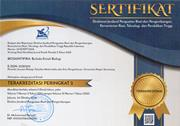Enhancement of Microalgal Metabolite Production through Euglena sp. Local Strain and Glagah Strain Consortia
(1) Faculty of Biology, Universitas Gadjah Mada
(2) Faculty of Biology, Universitas Gadjah Mada
(3) Faculty of Biology, Universitas Gadjah Mada
(4) Faculty of Biology, Universitas Gadjah Mada
(5) Faculty of Biology, Universitas Gadjah Mada
(6) Department of Chemical Engineering, Faculty of Engineering, Universitas Gadjah Mada
(7) Faculty of Biology, Universitas Gadjah Mada
Abstract
Euglena sp. is green microalgae in an acidic environment (pH 2.5-3.5). Euglena sp. has recently been developed widely in industry because of its capability to produce lipids that can be utilized to synthesize biofuel. Microalgae is a potential source of biodiesel, especially in the form of a consortium culture. One of the microalgae consortium cultures that have been explored is the nature consortium microalgae of Glagah strain. The Glagah consortia were isolated from Lagoon in the Glagah Beach, Kulonprogo, Yogyakarta. This study aimed to determine the total production of biomass, lipids, carbohydrates, and proteins of mixed culture of Glagah strain consortium and Euglena sp. as biodiesel substrate. The biomass test was measured using the dry weigh method using a filtration vacuum pump kit, lipids were measured using the Blight & Dryer method by adding chloroform and methanol as solvents, carbohydrates were measured using the Sulfur Phenol Acid method by adding Phenol and sulfuric acid (H2SO4), and proteins were measured using the Bradford method by adding SDS and Bradford’s solution. The total production and productivity of biomass, lipids, carbohydrates, and proteins showed that the mixed culture of Glagah strain consortium with Euglena sp. was higher than the Glagah strain consortium. It reached 0.410 g/L; 0.253; 0.856 g/L; and 0.623 g/L. Therefore, it could be concluded that the mixed culture of the Glagah strain consortium with Euglena sp. could increase the production of biomass, lipids, carbohydrates, and protein up to two times that of the Glagah strain consortium so that this mixed culture treatment could be used as a reference in microalgae cultivation for biodiesel.
Keywords
Full Text:
PDFReferences
Aslam, A. (2017). Protein quantification of mixed microalgae consortia under different concentration of Coal fired flue gas. International Journal of Biosciences (IJB), 10(2), 72–80. https://doi.org/10.12692/ijb/10.2.72-80
Bligh, E. G., & Dyer, W. J. (1959). A Rapid Method of Total Lipid Extraction and Purification. Canadian Journal of Biochemistry and Physiology, 37.
Bradford, M. M. (1976). A Rapid and Sensitive Method for the Quantitation of Microgram Quantities of Protein Utilizing the Principle of Protein-Dye Binding. Analytical Biochemistry, 72, 248–254. https://doi.org/10.1016/j.cj.2017.04.003
Cramer, M., & Myers, J. (1952). Growth and photosynthetic characteristics of euglena gracilis. Archiv Für Mikrobiologie, 17(1–4), 384–402. https://doi.org/10.1007/BF00410835
Dubois, M., Gilles, K. A., Hamilton, J. K., Rebers, P. A., & Smith, F. (1956). Colorimetric Method for Determination of Sugars and Related Substances. Analytical Chemistry, 28(3), 350–356. https://doi.org/10.1021/ac60111a017
Eko Agus Suyono, Winarto Haryadi, Muhammad Zusron, Matin Nuhamunada, Sri Rahayu, & Andhika Puspito Nugroho. (2015). The Effect of Salinity on Growth, Dry Weight and Lipid Content of the Mixed Microalgae Culture Isolated from Glagah as Biodiesel Substrate. Journal of Life Sciences, 10(5), 229–233. https://doi.org/10.17265/1934-7391/2015.05.006
Galvão, R. M., Santana, T. S., Fontes, C. H. O., & Sales, E. A. (2013). Modeling of Biomass Production of Haematococcus pluvialis. Applied Mathematics, 04(08), 50–56. https://doi.org/10.4236/am.2013.48a008
Gissibl, A., Sun, A., Care, A., Nevalainen, H., & Sunna, A. (2019). Bioproducts From Euglena gracilis: Synthesis and Applications. Frontiers in Bioengineering and Biotechnology, 7. https://doi.org/10.3389/fbioe.2019.00108
Goli, A., Shamiri, A., Talaiekhozani, A., Eshtiaghi, N., Aghamohammadi, N., & Aroua, M. K. (2016). An overview of biological processes and their potential for CO2 capture. Journal of Environmental Management, 183, 41–58. https://doi.org/10.1016/j.jenvman.2016.08.054
Gonçalves, A. L., Rodrigues, C. M., Pires, J. C. M., & Simões, M. (2016). The effect of increasing CO2 concentrations on its capture, biomass production and wastewater bioremediation by microalgae and cyanobacteria. Algal Research, 14, 127–136. https://doi.org/10.1016/j.algal.2016.01.008
Hanief, S., Prasakti, L., Pradana, Y. S., Cahyono, R. B., & Budiman, A. (2020). Growth kinetic of Botryococcus braunii microalgae using Logistic and Gompertz Models. AIP Conference Proceedings, 2296(November). https://doi.org/10.1063/5.0030459
Insan, A. I., Hidayah, H. A., Widyartini, D. S., & Article, H. (2018). Biosaintifika. 10(2), 439–447.
Jiménez, C., Cossío, B. R., Labella, D., & Niell, F. X. (2003). The feasibility of industrial production of Spirulina (Arthrospira) in Southern Spain. Aquaculture, 217(1–4), 179–190. https://doi.org/10.1016/S0044-8486(02)00118-7
Johnston, P. L., & Carell, E. F. (1973). Vitamin B12 and the macromolecular composition of euglena: II. recovery from unbalanced growth induced by vitamin B12 deficiency. Journal of Cell Biology, 57(3), 668–674. https://doi.org/10.1083/jcb.57.3.668
Kazamia, E., Aldridge, D. C., & Smith, A. G. (2012). Synthetic ecology - A way forward for sustainable algal biofuel production? Journal of Biotechnology, 162(1), 163–169. https://doi.org/10.1016/j.jbiotec.2012.03.022
Koreiviene, J., Valčiukas, R., Karosiene, J., & Baltrenas, P. (2014). Testing of Chlorella/Scenedesmus microalgae consortia for remediation of wastewater, CO2 mitigation and algae biomass feasibility for lipid production. Journal of Environmental Engineering and Landscape Management, 22(2), 105–114. https://doi.org/10.3846/16486897.2013.911182
Kurnianto, D., & Agus Suyono, E. (2021). Effect of inoculant density on the growth of glagah consortium culture. IOP Conference Series: Earth and Environmental Science, 860(1). https://doi.org/10.1088/1755-1315/860/1/012033
Lam, M. K., Yusoff, M. I., Uemura, Y., Lim, J. W., Khoo, C. G., Lee, K. T., & Ong, H. C. (2017). Cultivation of Chlorella vulgaris using nutrients source from domestic wastewater for biodiesel production: Growth condition and kinetic studies. Renewable Energy, 103, 197–207. https://doi.org/10.1016/j.renene.2016.11.032
Maharani, D. K., Ardi, A., Syahrin, A. A., Samudra, T. T., Pradana, Y. S., Budiman, A., & Suyono, E. A. (2020). The effect of photoperiod on lipid production of mixed culture Arthrospira maxima Setchell et Gardner and microalgae consortium of glagah isolate. AIP Conference Proceedings, 2260. https://doi.org/10.1063/5.0016187
Novoveská, L., Franks, D. T., Wulfers, T. A., & Henley, W. J. (2016). Stabilizing continuous mixed cultures of microalgae. Algal Research, 13, 126–133. https://doi.org/10.1016/j.algal.2015.11.021
Nur, F. (2021). Mixed cultures of Glagah Strain Consortium with Euglena sp. for Optimization of Biomass, Lipid, Carbohydrate, and Protein Production as a Source of Biodiesel. Gadjah Mada University.
Phatarpekar, P. V., Sreepada, R. A., Pednekar, C., & Achuthankutty, C. T. (2000). A comparative study on growth performance and biochemical composition of mixed culture of Isochrysis galbana and Chaetoceros calcitrans with monocultures. Aquaculture, 181(1–2), 141–155. https://doi.org/10.1016/S0044-8486(99)00227-6
Phukoetphim, N., Salakkam, A., Laopaiboon, P., & Laopaiboon, L. (2017). Kinetic models for batch ethanol production from sweet sorghum juice under normal and high gravity fermentations: Logistic and modified Gompertz models. Journal of Biotechnology, 243, 69–75. https://doi.org/10.1016/j.jbiotec.2016.12.012
Puja Asiandu, A., Puspito Nugroho, A., Saifun Naser, A., Ryan Sadewo, B., Donny Koerniawan, M., Budiman, A., Juniarti Siregar, U., Tri Suwanti, L., & Agus Suyono, E. (2022). The Effect of Tofu Wastewater and pH on the Growth Kinetics and Biomass Composition of Euglena sp. Current Applied Science and Technology, 23(2), 1–16. https://doi.org/10.55003/cast.2022.02.23.010
Rahmawati, B., Ilmi, M., Budiman, A., & Agus Suyono, E. (2020). Screening of IAA Production on the Interaction of Microalgae and Bacteria in the Glagah Consortium. Biosciences, Biotechnology Research Asia, 17(1), 45–52. https://doi.org/10.13005/bbra/2808
Sayegh, F. A. Q., & Montagnes, D. J. S. (2011). Temperature shifts induce intraspecific variation in microalgal production and biochemical composition. Bioresource Technology, 102(3), 3007–3013. https://doi.org/10.1016/j.biortech.2010.10.011
Suyono, E. A., Fahrunnida, Nopitasari, S., & Utama, I. V. (2016). Identification of microalgae species and lipid profiling of Glagah consortium for biodiesel development from local marine resource. ARPN Journal of Engineering and Applied Sciences, 11(16), 9970–9973.
Suyono, E. A., Retnaningrum, E., & Ajijah, N. (2018). Bacterial symbionts isolated from mixed microalgae culture of Glagah strains. International Journal of Agriculture and Biology, 20(1), 33–36. https://doi.org/10.17957/IJAB/15.0326
Um, B. H., & Kim, Y. S. (2009). Review: A chance for Korea to advance algal-biodiesel technology. Journal of Industrial and Engineering Chemistry, 15(1), 1–7. https://doi.org/10.1016/j.jiec.2008.08.002
Watanabe, T., Shimada, R., Matsuyama, A., Yuasa, M., Sawamura, H., Yoshida, E., & Suzuki, K. (2013). Antitumor activity of the β-glucan paramylon from Euglena against preneoplastic colonic aberrant crypt foci in mice. Food and Function, 4(11), 1685–1690. https://doi.org/10.1039/c3fo60256g
Zhu, J., Chen, W., Chen, H., Zhang, X., He, C., Rong, J., & Wang, Q. (2016). Improved productivity of neutral lipids in Chlorella sp. A2 by minimal nitrogen supply. Frontiers in Microbiology, 7(APR), 1–11. https://doi.org/10.3389/fmicb.2016.00557
Zulkarnain, M. I., Rahayu, H. T., Herida, A. P., Erfianti, T., Kusumaningrum, H. P., Zainuri, M., Endrawati, H., Widowati, I., Haryanti, W. D. U., & Mahendrajaya, R. T. (2021). Improvement of the potency of microalgae Nannochloropsis and Chaetoceros through antioxidant analysis and optimization of DNA isolation. Journal of Physics: Conference Series, 1943(1). https://doi.org/10.1088/1742-6596/1943/1/012080
Refbacks
- There are currently no refbacks.

This work is licensed under a Creative Commons Attribution 4.0 International License.



